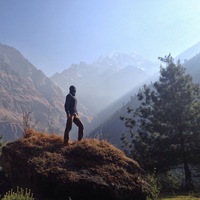Сегодня начинается мой опыт молчания и изучения того, что происходит внутри меня.
.
Если быть совсем строгим, то... у меня будет уникальный опыт столкновения с самим собой.
.
Это то, чего все мы боимся больше всего. То, чего мы всю жизнь старательно избегаем.
.
Я знаю действительно много людей, у которых дома всегда работает телевизор на фоне. Как в цыганском гипнозе - постоянное отвлечение. Только добровольное. Чтобы ни в коем случае не позволить "экзистенциальному ужасу" поселиться в себе. Не позволить внутри себя возникнуть вопросам о самом себе, о жизни, о том, что мы делаем тут и зачем. Телевизор на фоне, интернет в телефоне, еда в тарелке, пропылесосить, запланировать что-то, ещё-ещё-ещё.
.
Главное не позволить остаться себе наедине с собой. В одиночестве. В тишине. Не столкнуться со всем тем, что стучится изнутри, и от чего мы так старательно отворачиваемся всю жизнь.
.
И вот про что випассана:
.
Про смотреть внутрь себя - на свой опыт, мысли и чувства, осознавать всё это и переживать. Переживать - значит установливать смысловое соответствие между сознанием и "реальностью".
Другими словами, переживать — это осознавать и накапливать опыт.
Но этот процесс проходит только когда осядут эмоции.
Если что-то отвлечет (а в начале я написал, какие мы в этом мастера), эмоция будет вытеснена в подсознание и станет психологическим комплексом.
.
Вытесненные эмоции множатся с новыми и усиливают любые реакции - злость, обиды, нетерпение, печаль, депрессия...что угодно.
Если же эмоция была пережита и осознана, реакция на новые подобные события будет более нейтральной и уравновешенной.
Соответственно, на випассане учат не множить эмоции, а переживать и осознавать их.
.
Что для этого делают:
.
*Помогают избавиться от внешних раздражителей. (молчание и всё то из прошлой записи)
*Учат успокаивать ум.
*Учат наблюдать ощущения и эмоции, позволять им происходить, но не контролировать их и не реагировать.
*Учат вспоминать, осознавать и переживать всё, что волнует мозг.
.
Сначала учат успокаивать ум - наблюдая за дыханием, и не пытаясь управлять им.
Потом учат наблюдать эмоции и чувства.
Органы чувств адаптируются к силе внешних раздражителей. Если избавиться от сильных ощущений, мозг начнёт различать слабые. Если сидеть в зале для медитации в тишине и полутьме без движения, мозг начнёт различать очень тонкие ощущения.
Когда так сильно повышается чувствительность, вы учитесь сканировать тело с головы до пяток, находить ощущения, связывать их с эмоциями и наблюдать. Это и есть медитация "Випассана".
.
За время нахождения в монастыре на в курсе випассаны вспоминается, осознаётся и завершается много пережитого опыта. На сознательном уровне это может происходить в форме инсайтов — неожиданных, отчасти интуитивных прорывах к пониманию поставленной проблемы и «внезапном» нахождении её решения.
.
Вот и всё, что я могу об этом рассказать. Точнее, пересказать опыт других людей!
А теперь начинается мой личный опыт випассаны.
.
"За сто веков мы себе уяснили едва: Помимо желудка, отходы производит голова..." (с) Грот
.
А вместо меня, мои заранее записанные мысли вам будет рассказывать специальная программа) и смешно, и интересно одновременно. Выйду из "заточения" - отвечу на все комментарии. Так что не стесняйтесь - комментируйте ;)
.
Если быть совсем строгим, то... у меня будет уникальный опыт столкновения с самим собой.
.
Это то, чего все мы боимся больше всего. То, чего мы всю жизнь старательно избегаем.
.
Я знаю действительно много людей, у которых дома всегда работает телевизор на фоне. Как в цыганском гипнозе - постоянное отвлечение. Только добровольное. Чтобы ни в коем случае не позволить "экзистенциальному ужасу" поселиться в себе. Не позволить внутри себя возникнуть вопросам о самом себе, о жизни, о том, что мы делаем тут и зачем. Телевизор на фоне, интернет в телефоне, еда в тарелке, пропылесосить, запланировать что-то, ещё-ещё-ещё.
.
Главное не позволить остаться себе наедине с собой. В одиночестве. В тишине. Не столкнуться со всем тем, что стучится изнутри, и от чего мы так старательно отворачиваемся всю жизнь.
.
И вот про что випассана:
.
Про смотреть внутрь себя - на свой опыт, мысли и чувства, осознавать всё это и переживать. Переживать - значит установливать смысловое соответствие между сознанием и "реальностью".
Другими словами, переживать — это осознавать и накапливать опыт.
Но этот процесс проходит только когда осядут эмоции.
Если что-то отвлечет (а в начале я написал, какие мы в этом мастера), эмоция будет вытеснена в подсознание и станет психологическим комплексом.
.
Вытесненные эмоции множатся с новыми и усиливают любые реакции - злость, обиды, нетерпение, печаль, депрессия...что угодно.
Если же эмоция была пережита и осознана, реакция на новые подобные события будет более нейтральной и уравновешенной.
Соответственно, на випассане учат не множить эмоции, а переживать и осознавать их.
.
Что для этого делают:
.
*Помогают избавиться от внешних раздражителей. (молчание и всё то из прошлой записи)
*Учат успокаивать ум.
*Учат наблюдать ощущения и эмоции, позволять им происходить, но не контролировать их и не реагировать.
*Учат вспоминать, осознавать и переживать всё, что волнует мозг.
.
Сначала учат успокаивать ум - наблюдая за дыханием, и не пытаясь управлять им.
Потом учат наблюдать эмоции и чувства.
Органы чувств адаптируются к силе внешних раздражителей. Если избавиться от сильных ощущений, мозг начнёт различать слабые. Если сидеть в зале для медитации в тишине и полутьме без движения, мозг начнёт различать очень тонкие ощущения.
Когда так сильно повышается чувствительность, вы учитесь сканировать тело с головы до пяток, находить ощущения, связывать их с эмоциями и наблюдать. Это и есть медитация "Випассана".
.
За время нахождения в монастыре на в курсе випассаны вспоминается, осознаётся и завершается много пережитого опыта. На сознательном уровне это может происходить в форме инсайтов — неожиданных, отчасти интуитивных прорывах к пониманию поставленной проблемы и «внезапном» нахождении её решения.
.
Вот и всё, что я могу об этом рассказать. Точнее, пересказать опыт других людей!
А теперь начинается мой личный опыт випассаны.
.
"За сто веков мы себе уяснили едва: Помимо желудка, отходы производит голова..." (с) Грот
.
А вместо меня, мои заранее записанные мысли вам будет рассказывать специальная программа) и смешно, и интересно одновременно. Выйду из "заточения" - отвечу на все комментарии. Так что не стесняйтесь - комментируйте ;)
Today my experience of silence and the study of what is happening inside me begins.
.
To be completely strict, then ... I will have a unique experience of encountering myself.
.
This is what we all fear the most. That which we have carefully avoided all our lives.
.
I know really a lot of people who always have TV in the background at home. As in gypsy hypnosis - a constant distraction. Only voluntary. In no case to allow "existential horror" to settle in itself. Do not allow questions to arise within ourselves about ourselves, about life, about what we are doing here and why. TV in the background, Internet on the phone, food on the plate, vacuum, plan something, more, more, more.
.
The main thing is not to allow yourself to be left alone. Lonely. In silence. Not to be confronted with everything that is knocking from the inside, and from which we have so painstakingly turned away all our lives.
.
And that's about vipassana:
.
About looking inside yourself - at your own experience, thoughts and feelings, being aware of all this and experiencing it. To survive means to establish a semantic correspondence between consciousness and "reality."
In other words, experiencing is realizing and gaining experience.
But this process takes place only when emotions settle.
If something distracts (and in the beginning I wrote what kind of masters we are in this), the emotion will be squeezed into the subconscious and become a psychological complex.
.
The supplanted emotions multiply with new ones and intensify any reactions - anger, resentment, impatience, sadness, depression ... whatever.
If the emotion was experienced and realized, the reaction to new similar events will be more neutral and balanced.
Accordingly, Vipassana is taught not to multiply emotions, but to experience and be aware of them.
.
What do they do for this:
.
* Help get rid of external irritants. (silence and all that from the last entry)
* Learn to calm the mind.
* Learn to observe sensations and emotions, allow them to occur, but do not control them and do not react.
* Learn to remember, realize and experience everything that excites the brain.
.
First, they teach to calm the mind - observing the breath, and not trying to control it.
Then they learn to observe emotions and feelings.
The sensory organs adapt to the strength of external stimuli. If you get rid of strong sensations, the brain will begin to distinguish between weak ones. If you sit in the meditation room in silence and darkness without movement, the brain will begin to distinguish between very subtle sensations.
When sensitivity increases so much, you learn to scan the body from head to toe, find sensations, associate them with emotions and observe. This is Vipassana meditation.
.
During the stay in the monastery, Vipassana is remembered, realized and completed a lot of experienced experiences. On a conscious level, this can happen in the form of insights - unexpected, partly intuitive breakthroughs in understanding the problem posed and finding its solution “suddenly”.
.
That’s all I can tell you about it. More precisely, retell the experience of other people!
And now my personal experience of vipassana begins.
.
"For a hundred centuries, we barely realized: Apart from the stomach, the head produces waste ..." (c) Grotto
.
And instead of me, my pre-recorded thoughts will be told to you by a special program) both funny and interesting at the same time. I’ll get out of prison - I will answer all the comments. So feel free to comment;)
.
To be completely strict, then ... I will have a unique experience of encountering myself.
.
This is what we all fear the most. That which we have carefully avoided all our lives.
.
I know really a lot of people who always have TV in the background at home. As in gypsy hypnosis - a constant distraction. Only voluntary. In no case to allow "existential horror" to settle in itself. Do not allow questions to arise within ourselves about ourselves, about life, about what we are doing here and why. TV in the background, Internet on the phone, food on the plate, vacuum, plan something, more, more, more.
.
The main thing is not to allow yourself to be left alone. Lonely. In silence. Not to be confronted with everything that is knocking from the inside, and from which we have so painstakingly turned away all our lives.
.
And that's about vipassana:
.
About looking inside yourself - at your own experience, thoughts and feelings, being aware of all this and experiencing it. To survive means to establish a semantic correspondence between consciousness and "reality."
In other words, experiencing is realizing and gaining experience.
But this process takes place only when emotions settle.
If something distracts (and in the beginning I wrote what kind of masters we are in this), the emotion will be squeezed into the subconscious and become a psychological complex.
.
The supplanted emotions multiply with new ones and intensify any reactions - anger, resentment, impatience, sadness, depression ... whatever.
If the emotion was experienced and realized, the reaction to new similar events will be more neutral and balanced.
Accordingly, Vipassana is taught not to multiply emotions, but to experience and be aware of them.
.
What do they do for this:
.
* Help get rid of external irritants. (silence and all that from the last entry)
* Learn to calm the mind.
* Learn to observe sensations and emotions, allow them to occur, but do not control them and do not react.
* Learn to remember, realize and experience everything that excites the brain.
.
First, they teach to calm the mind - observing the breath, and not trying to control it.
Then they learn to observe emotions and feelings.
The sensory organs adapt to the strength of external stimuli. If you get rid of strong sensations, the brain will begin to distinguish between weak ones. If you sit in the meditation room in silence and darkness without movement, the brain will begin to distinguish between very subtle sensations.
When sensitivity increases so much, you learn to scan the body from head to toe, find sensations, associate them with emotions and observe. This is Vipassana meditation.
.
During the stay in the monastery, Vipassana is remembered, realized and completed a lot of experienced experiences. On a conscious level, this can happen in the form of insights - unexpected, partly intuitive breakthroughs in understanding the problem posed and finding its solution “suddenly”.
.
That’s all I can tell you about it. More precisely, retell the experience of other people!
And now my personal experience of vipassana begins.
.
"For a hundred centuries, we barely realized: Apart from the stomach, the head produces waste ..." (c) Grotto
.
And instead of me, my pre-recorded thoughts will be told to you by a special program) both funny and interesting at the same time. I’ll get out of prison - I will answer all the comments. So feel free to comment;)

У записи 9 лайков,
0 репостов,
337 просмотров.
0 репостов,
337 просмотров.
Эту запись оставил(а) на своей стене Аристон Аристархов





























